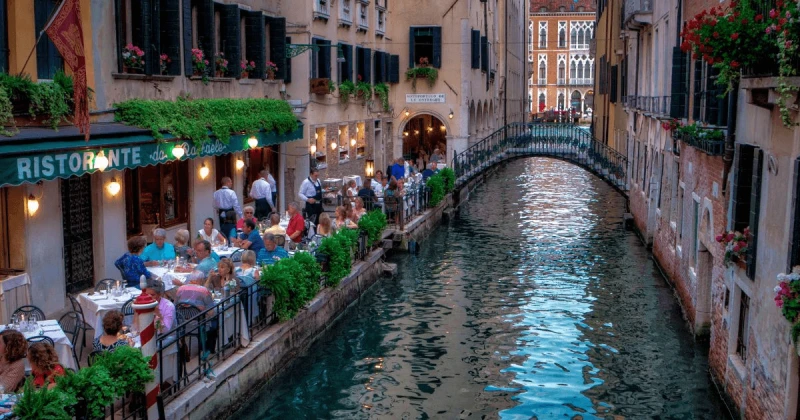Politicization of food: Italy’s far right has turned food into a political battleground
Politicization of food: Italy’s far right has turned food into a political battleground


Since its rise to power in 2022, a coalition of far right parties led by Italian Prime Minister Giorgia Meloni and Deputy Prime Minister Matteo Salvini has fashioned food as a political prop. Salvini, who leads the right-wing Lega party, posts pictures and video content defending his favorite Italian foods. Recently, the politician declared that, “now more than ever, to eat Italian is a political act.” As nationalism grows in Europe and in Italy — a nation in which the importance of food is second to none — the far right is consolidating what counts as Italian.
Anti-Vegan Sentiment in Italy
Last year, Italy banned the production and sale of cell-cultivated meat — a move which will likely clash with the European Union’s free trade regulations. In defense of the ban, Salvini linked cell-cultivated meat to a declining job market, growing bureaucracy and uncontrolled immigration. He lumps these issues together and claims the European Union’s influence and regulation is to blame for Italy’s problems. Food is simply the proxy to prove his political point. The minister even called cell-cultivated meat one of the “concrete issues” that his conservative coalition stands against.
Culinary Racism in Italy
In the wake of increased immigration, a wave of bans on foreign foods have swept throughout Italy. Starting in 2009, the town of Lucca prohibited any new so-called “ethnic” restaurants from opening. Since then, cities like Florence, Verona and Trieste have all put an end to foreign cuisine in efforts to protect what they consider to be their own culinary traditions. When the city of Venice banned kebabs from being served in the city, its mayor said the Middle Eastern delicacy was “not compatible with the preservation and development of Venice’s cultural heritage.”
Gastronationalism in Italy
Gianfranco Marrone, PhD, an Italian professor at the University of Palermo, studies the symbolism and discourse around Italian food. He, like chef Zacurri, is skeptical of far right food politics. According to him, there is something about gastronationalism — which means using food to conserve a country’s political identity — that “makes no sense.”
The Meat Industry and Meat Consumption in Italy
While a reason for Italy’s recent obsession with vegans and immigrants who don’t eat certain meats could be found within industry concerns, the reality is that facism — especially food facism — doesn’t have to make a spoonful of sense. Gastronationalism is much more about nationalism than cuisine; the facts don’t matter compared to what politicians say, and what people feel. Food represents so much more than what’s on the plate, and our sense of taste is so subjective.
This is an excerpt. Read the original post here

 | Videos | More... |

Video: Nuclear energy will destroy us? Global warming is an existential threat? Chemicals are massacring bees? Donate to the Green Industrial Complex!
 | Bees & Pollinators | More... |

GLP podcast: Science journalism is a mess. Here’s how to fix it

Mosquito massacre: Can we safely tackle malaria with a CRISPR gene drive?

Are we facing an ‘Insect Apocalypse’ caused by ‘intensive, industrial’ farming and agricultural chemicals? The media say yes; Science says ‘no’
 | Infographics | More... |

Infographic: Global regulatory and health research agencies on whether glyphosate causes cancer
 | GMO FAQs | More... |

Why is there controversy over GMO foods but not GMO drugs?

How are GMOs labeled around the world?

How does genetic engineering differ from conventional breeding?
 | GLP Profiles | More... |

Alex Jones: Right-wing conspiracy theorist stokes fear of GMOs, pesticides to sell ‘health supplements’




 Viewpoint — Fact checking MAHA mythmakers: How wellness influencers and RFK, Jr. undermine American science and health
Viewpoint — Fact checking MAHA mythmakers: How wellness influencers and RFK, Jr. undermine American science and health Viewpoint: Video — Big Solar is gobbling up productive agricultural land and hurting farmers yet providing little energy or sustainabilty gains
Viewpoint: Video — Big Solar is gobbling up productive agricultural land and hurting farmers yet providing little energy or sustainabilty gains Fighting deforestation with CO2: Biotechnology breakthrough creates sustainable palm oil alternative for cosmetics
Fighting deforestation with CO2: Biotechnology breakthrough creates sustainable palm oil alternative for cosmetics Trust issues: What happens when therapists use ChatGPT?
Trust issues: What happens when therapists use ChatGPT? 30-year-old tomato line shows genetic resistance to devastating virus
30-year-old tomato line shows genetic resistance to devastating virus California, Washington, Oregon forge immunization alliance to safeguard vaccine access against federal undermining
California, Washington, Oregon forge immunization alliance to safeguard vaccine access against federal undermining The free-range chicken dilemma: Better for birds, but with substantial costs
The free-range chicken dilemma: Better for birds, but with substantial costs ‘You have to treat the brain first’: Rethinking chronic pain with Sanjay Gupta
‘You have to treat the brain first’: Rethinking chronic pain with Sanjay Gupta
